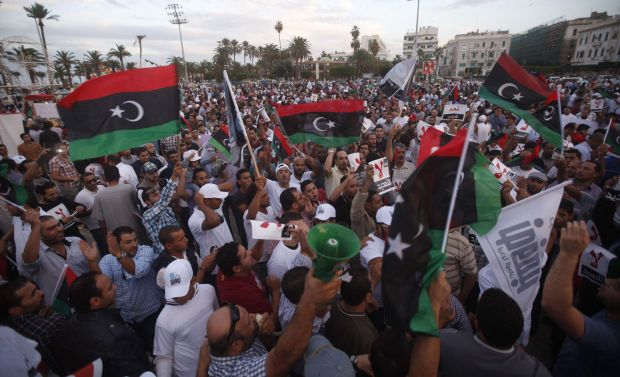The situation in Libya appears to be deteriorating in light of tensions in the region involving Egypt and Tunisia, though Tunisia has managed to establish partial stability following the ratification of the Tunisian constitution.
Escalating threats from Al-Qaeda and organized crime groups in Libya have spurred Libyan, Egyptian and Tunisian authorities to cooperate in their attempts to contain these groups. A lack of stability and widespread lapses in security has enabled these groups to flourish, and they have also benefited from an abundance of easily available weapons. In addition, revolutionary and radical beliefs are similar across these countries due to their close proximity.
The current state of affairs in Egypt has forced extremist Islamist groups and Muslim Brotherhood cadres to flee across Egypt’s borders. Some fled to Libya in search of a safe haven, which they hoped would be provided by fellow members of the Muslim Brotherhood and jihadists in the Libyan Islamic Fighting Group and Al-Qaeda in the Islamic Maghreb.
The accumulation of Egyptian Muslim Brotherhood groups in Libya has reinforced the Libyan Brotherhood, which they believe will help prevent a repetition of the events in Egypt. The Brotherhood in Libya has fomented tribal and political conflict between centrists and Muslim extremists as a pretext to motivate Islamists to rally together at the center ground. The same happened recently in Tunisia.
Millions of Libyans travel to Egypt and Tunisia each year for business, tourism, medical treatment and education. Much of the population of Eastern Libya has close family relationships with Egyptians, a fact that led to an exchange of ideas, and mutually reinforcing revolutionary movements in Libya and Egypt.
Modern history shows that what happens in Egypt quickly spreads to neighboring countries. The Libyan revolution took place on February 17, 2011, only a few weeks after the Egyptian revolution of January 25. Historically, Egypt is considered the “heart” of the Arab Middle East, and what occurs in Egypt directly affects surrounding countries.
Libya is a strategic issue for Egypt, and cooperation with surrounding countries like Tunisia is an essential part of Egyptian national security. Today, Islamists are attempting to seize the reins of power in Libya by employing the services of armed brigades, which are used as a front for the expansion of extremist political Islam in most areas of eastern Libya, Benghazi, and Derna. This extends to the Libyan–Egyptian border and could eventually spread into Egyptian territory in the neighboring Matrouh Governorate. This has made the Egyptian–Libyan border susceptible to penetration by extremist groups who aim to carry out terrorist operations as a means to put political pressure on Egypt. A situation like this can lead to a state of turmoil, opening the door for political negotiations between the current Egyptian regime and extremist groups in the region, thereby affording them political legitimacy in the eyes of many.
This may lead, in one way or another, to Egyptian intervention in Libyan territory with the aim of combating terrorism. The obvious fact remains that tension within Libya clearly affects Tunisia, Egypt and Algeria. This is evidenced by the terrorist attacks that took place in Tunisia at the hands of extremists who were opposed to liberal currents within the country, which includes the assassination of opposition leader Chokri Belaid.
The success or failure of Islamists in Libya depends on the success or failure of Egypt’s current government, which seems to have taken on a military character. Thus what happened in Egypt is a warning to the Islamists in Libya to exercise caution or suffer the same fate the Egyptian Muslim Brotherhood did on July 3 last year.
On the other hand, the situation in Tunisia has a direct influence, not only on the political standing of the Muslim Brotherhood in Libya, but also on Libya as a whole. The recent adoption of a new constitution in Tunisia represented a glimmer of hope and a tool to influence affairs in Libya. The polarization between radical and liberal currents of Islam has led to the Muslim Brotherhood’s emergence under the mantle of moderate Islam. This is, of course, a safe haven for the Brotherhood and a way to pursue their political plans as usual, as we saw in the ratification of Tunisia’s new constitution. The constitution functioned as a lifeline that allowed the Brotherhood to continue to exist as a borderless international organization. They have interests in the policies of the Arab Spring nations, and in this sense, amendments to the Tunisian constitution may influence political affairs in Libya.
We can see communication and interdependent relations between Islamist movements around the world. The fall of one of these groups in a specific country is a call for all of them to reevaluate how to save one another. In practical terms, you cannot isolate the situation in Libya from Egypt or Tunisia because they are strategically tied to one another. We have seen this in Egypt’s posturing toward the Libyan revolution and when the Military Council opened the Libyan border so that humanitarian aid could pass through from Egypt. On the strategic level, success and stability in Libya translates into economic, military, and political success for Egypt as another nation of the ‘Arab Spring.’
The counterpoint to this article can be read here.
